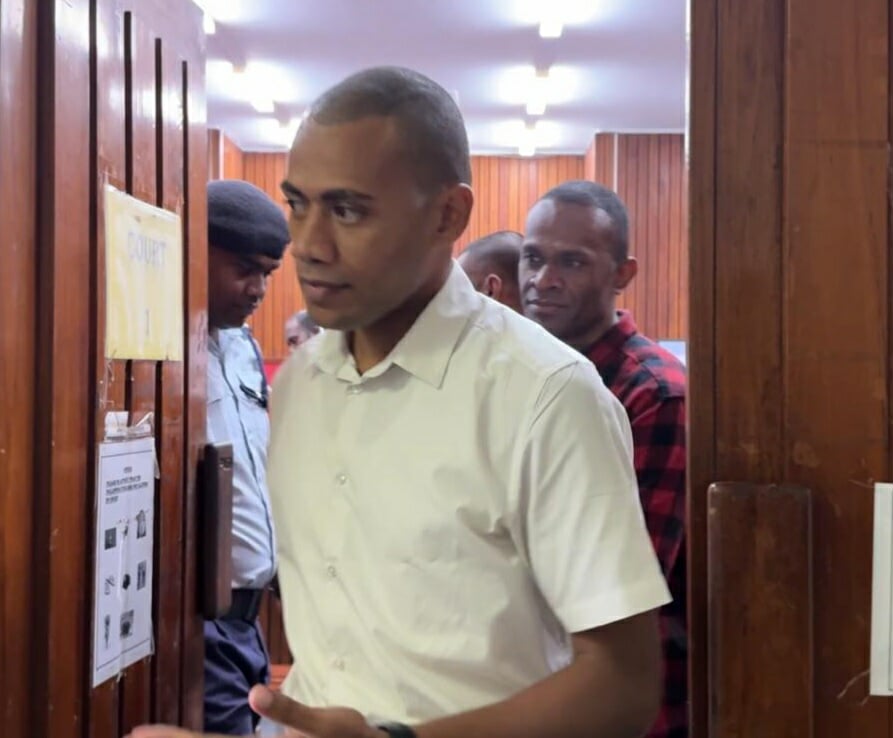JUDGMENT in the 4.15 tonnes methamphetamine case has been set by the High Court in Lautoka for July 31.
While closing the State’s submissions, Deputy Director of Public Prosecutions John Rabuku said it was not clear what the end game was for the accused persons involved in the discovery and seizure of the 4.15 tonnes of methamphetamine from Legalega in Nadi in January, 2024.
Justin Ho (1st accused), David Heritage (2nd accused), Louie Logaivau (3rd accused), Ratu Aporosa Davelevu (4th accused), Sakiusa Tuva (5th accused), Jale Aukerea (6th accused), Ratu Osea Levula (7th accused), Cathy Tuirabe (8th accused) and Viliame Colawaliku (9th accused) appeared before Justice Aruna Aluthge yesterday.
Sakiusa Tuva and Cathy Tuirabe had pleaded guilty on June 9, 2025.
Mr Tuva admitted to three counts of unlawful possession while Ms Tuirabe pleaded guilty to unlawful possession of illicit drugs.
Mr Heritage, Mr Logaivau, Mr Davelevu, Mr Aukerea, Mr Levula and Mr Colowaliku took the stand last week, except for the first accused, Mr Ho, who exercised his legal right on remaining silent during the submissions of evidence by their lawyers.
“This is not a technically difficult case,” Mr Rabuku said.
“It is a simple but astronomical one.
“At the centre of this is the largest methamphetamine seizure in the Pacific region, including Australia and New Zealand.
“It is an astronomical case because of the amount of methamphetamine that was seized. It involves the importation of over 4.15 tonnes of methamphetamine into Fiji and the possession of it by these accused persons and others, in various degrees and forms between the months of November 2023 to the month of January 2024.”
Mr Rabuku said it also involved the possession of monies seized from Mr Ho and Mr Aukerea which were believed to be proceeds of crime.
“It is not clear what was the end game for all these accused persons.”
Mr Rabuku said the enormity of the seizure indicated it certainly could not be for their personal consumption, let alone for local trade.
“It could then be for only two reasons. First, to repackage and traffic some of it to other destinations around the Pacific and beyond, including New Zealand and Australia, because of their appetite for meth and, second, to sell and traffic some of it nationally for local consumption.
“Whatever it is, the drastic effects of the sale and trafficking of this methamphetamine haul, if it was not seized by the police, on the wider national and Pacific communities, would have been devastating.
“At the close of the State’s case, the court ruled that there was a case to answer for the 1st, 2nd, 3rd, 4th, 6th, 7th, and 9th accused.
“The 5th and the 8th accused had pleaded guilty and admitted the summary of facts filed by the State in support of the counts charged against them.
“Therefore, these closing submissions are in relation to the 1st, 2nd, 3rd, 4th, 6th, 7th, and 9th accused only.
“From the outset, the State categorically submits that it has proven its case beyond reasonable doubt against the 1st, 2nd, 3rd, 4th, 6th, 7th and 9th accused, in respect of the counts they have been charged with.”
The law
Mr Rabuku said it was imperative that the State first dealt with the law on the legal issues that had emerged in these proceedings.
“The State’s case is in three parts. First on unlawful importation, second on unlawful possession and third on possession of property believed to be proceeds of crime.
“No doubt, the burden of proof lies with the State throughout the proceedings and the standard of proof, like in every criminal matter, is beyond reasonable doubt.
“Section 32 of the Illicit Drugs Control Act 2004 imposes only an evidential burden on the relevant accused, and the State has dealt with this in its submissions against Ratu Aporosa Davelevu on a case-to-answer.
“The defences that have emerged from the proceedings are duress and lack of knowledge. It is a matter of law that the State disproves beyond reasonable doubt these defences.
“The law on the legal issues that must be settled from the outset are in the following categories:
a: importation – unlawfully imports;
b: possession – knowledge and intention to possess;
c: joint possession;
d: accomplice evidence;
e: defence of duress; and
f: property suspected to be proceeds of crime.”
In his concluding remarks, Mr Rabuku said: “It is submitted that the accused persons acted jointly and in concert with each of the counts they are charged jointly on.
“It is that the State has proven its case beyond reasonable doubt on each count.
“In the final, it is submitted that the court must return a verdict of guilty on each accused person on each count on the information.”
The defence will submit its written submissions next Monday.

